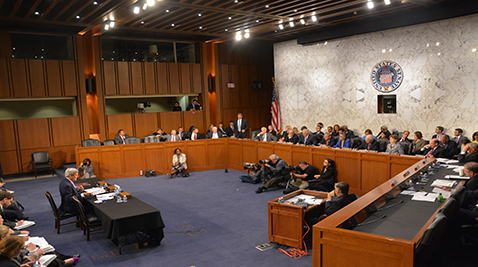
By Idrees Ali and Teddy Amenabar
Capital News Service
WASHINGTON – As President Barack Obama prepares to increase U.S. military action against the rapid expansion of Islamic extremists in Iraq and Syria, some members of Maryland’s congressional delegation want to guarantee that American troops will not get involved in a ground war.
The Obama administration, which has already carried out more than 150 airstrikes in Iraq to “degrade and destroy” the Islamic State group, has argued that it has the legal authority to do the same in Syria based on earlier congressional approvals. Authorization for Use of Military Force legislation, approved for the wars in Afghanistan and Iraq in 2001 and 2002, respectively, gave the Bush administration the authority to carry out military action in each country.
However, before increasing involvement to neutralize the Islamic State group in Iraq and Syria, some members of Maryland’s congressional delegation are calling for a new authorization. They want to hold the Obama administration to its promise to keep ground combat forces out of the mission.
“Congress should define the (Authorization for Use of Military Force) in a way that supports the mission as the president has stated it, and that includes preventing U.S. ground combat forces from being deployed in Syria or Iraq,” said Rep. Chris Van Hollen, D-Kensington.
While agreeing that previous authorizations could be used to attack the Islamic State group, Van Hollen said Congress must act quickly to revise the “broad authority” so it will not be used in an open-ended manner in future conflicts.
The Islamic State group, which broke off from al-Qaeda in Iraq, today controls large parts of Iraq and Syria with a goal to establish an Islamic caliphate across the region.
The authorizations in 2001 and 2002 were under “different circumstances,” said Sen. Ben Cardin, D-Md.
Cardin, who voted against the 2002 authorization in Iraq because it was “based on misinformation,” said if previous authorizations could be used for airstrikes an argument could be made for ground troops as well, something he said was not acceptable.
While supporting military strikes in Iraq against what he termed a “barbaric terrorist” network, he is skeptical that military action alone can turn the tide in Syria. Cardin added that while there is no urgency in seeking congressional approval for strikes, it is vital to get that approval eventually.
Across the aisle, Rep. Andy Harris, R-Cockeysville, said there was a sense that further debate needed to take place on the question of authorization.
“It is unclear whether the Authorization for Use of Military Force gives authority for strikes in Syria. As a result, the President should have come to Congress and asked for authority to combat this enemy,” said Chris Meekins, deputy chief of staff for policy for Harris, in an email.
Wednesday, the House passed a much narrower bill to provide further training and arming of moderate Syrian rebels by a vote of 273-156.
“I was for this, which I think is a very limited step to help train and equip those that will confront (the Islamic State group) on the ground,” said House Minority Whip Steny Hoyer, a Democrat from Maryland.
Meekins said Republican Harris, who voted against the bill, believes the Obama administration does not have “in place a plan to ensure the proper vetting of Syrian rebels,” and there is no guarantee the weapons won’t eventually be used against the U.S.
On Thursday, the Senate voted to pass a bill that would arm and train Syrian rebels 78-22. Both of Maryland’s delegates voted for the bill.
Last week, Obama announced direct U.S. airstrikes in Syria to weaken the Islamic State group.
“We’re moving ahead with our strategy to degrade and ultimately destroy this terrorist organization,” Obama said.
Obama said Wednesday, and Secretary of State John Kerry concurred at a Senate Foreign Relations Committee hearing, that the use of ground combat troops is out of the question.
“The U.S. will not go it alone,” said Kerry, who recently returned from the region where he was shoring up support for an action plan. “That’s why we’re building a coalition.”
Despite repeated questions from the Senate Foreign Relations Committee, Kerry didn’t give specifics about the expected contributions from specific partner countries.


You must be logged in to post a comment.